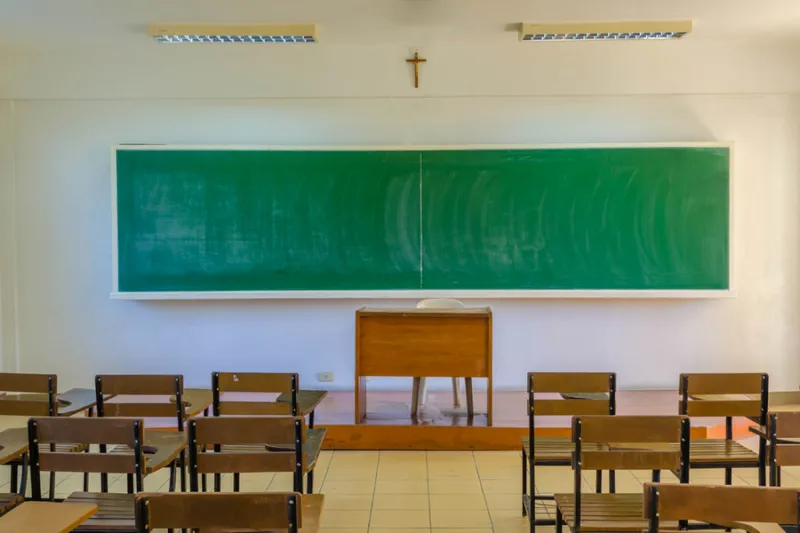
Denver Newsroom, Jun 21, 2022 / 10:55 am (CNA).
The Supreme Court on Tuesday ruled 6-3 that Maine’s policy barring students in a student-aid program from using their aid to attend “sectarian” schools violates the free exercise clause of the First Amendment.
“Regardless of how the benefit and restriction are described, the program operates to identify and exclude otherwise eligible schools on the basis of their religious exercise,” Chief Justice John Roberts wrote in the June 21 decision in Carson v. Makin.
He added that “a neutral benefit program in which public funds flow to religious organizations through the independent choices of private benefit recipients does not offend the Establishment Clause.”
“Maine’s decision to continue excluding religious schools from its tuition assistance program … thus promotes stricter separation of church and state than the Federal Constitution requires.”
Roberts noted that Maine “pays tuition for certain students at private schools— so long as the schools are not religious. That is discrimination against religion. A State’s antiestablishment interest does not justify enactments that exclude some members of the community from an otherwise generally available public benefit because of their religious exercise.”
Having chosen to fund private schools through its aid program, Roberts said, Maine cannot disqualify some private schools solely because they are religious.
The case was brought by the Carson family, consisting of parents Amy and David and their daughter Olivia, who reside in Glenburn, Maine. Because Glenburn has no public school system, families with school-age children are eligible for a school-choice program that pays tuition at either public or non-sectarian schools.
About 5,000 Maine students are eligible for this program, which excludes private schools that are “associated with a particular faith or belief system and which, in addition to teaching academic subjects, promotes the faith or belief system with which it is associated and/or presents the material taught through the lens of this faith,” which Maine considers “sectarian”.
The Carson parents are alumni of Bangor Christian Schools, a K-12 school in the nearby city of Bangor. But because Bangor Christian Schools mandates Bible class, it is ineligible for the town tuition program, meaning the Carsons have to pay for Olivia’s tuition.
The Carsons, along with two other Maine families seeking to send their children to “sectarian” schools, filed suit in 2018.
The Carson v. Makin decision referred to other recent rulings on free exercise and and equal protection.
In its June 2020 decision Espinoza v. Montana Department of Revenue, the court struck down as a violation of the free exercise clause a state scholarship program that excluded religious schools. And in 2017, the court found in Trinity Lutheran Church of Columbia, Inc. v. Comer that a church-owned playground can be eligible for a public benefit program.
Dissenting from the decision on Tuesday were Justices Stephen Breyer, who was joined by Elena Kagan, and in part, by Sonia Sotomayor, who also filed a dissenting opinion.
Breyer argued that the interpretation of the First Amendment advanced by the majority opinion will work against its “general purpose,” which he said is “to allow for an American society with practitioners of over 100 different religions, and those who do not practice religion at all, to live together without serious risk of religion-based social divisions.”
He also argued that Maine “excludes schools from its tuition program not because of the schools’ religious character but because the schools will use the funds to teach and promote religious ideals.”
“State funding of religious activity risks the very social conflict based upon religion that the Religion Clauses were designed to prevent. And, unlike the circumstances present in Trinity Lutheran and Espinoza, it is religious activity, not religious labels, that lies at the heart of this case,” Breyer maintained.
Ashley McGuire, senior fellow with The Catholic Association, called the majority opinion “another blow to bigoted and arcane anti-Catholic laws. If the pandemic has taught us anything, it’s that parents want and deserve better school choices for their kids. Religious families, and even families that aren’t religious but see the value in faith-based schools, should not be cut out from programs that help parents make the best educational choice for their kids. Maine’s law and others like it especially hurt low-income children who suffer the most in failed schools. Today’s win helps to end anti-religious discrimination and expands sorely-needed school choice for low-income families.”
Kelly Shackelford, president of First Liberty Institute, a law firm focused on religious freedom, commented: “We are thrilled that the Court affirmed once again that religious discrimination will not be tolerated in this country. Parents in Maine, and all over the country, can now choose the best education for their kids without fearing retribution from the government.”
The Second Vatican Council’s 1965 declaration on Christian education, Gravissimum educationis, said that parents “must enjoy true liberty in their choice of schools.”
“Consequently, the public power, which has the obligation to protect and defend the rights of citizens, must see to it, in its concern for distributive justice, that public subsidies are paid out in such a way that parents are truly free to choose according to their conscience the schools they want for their children.”
If you value the news and views Catholic World Report provides, please consider donating to support our efforts. Your contribution will help us continue to make CWR available to all readers worldwide for free, without a subscription. Thank you for your generosity!
Click here for more information on donating to CWR. Click here to sign up for our newsletter.


 By
By 

Leave a Reply